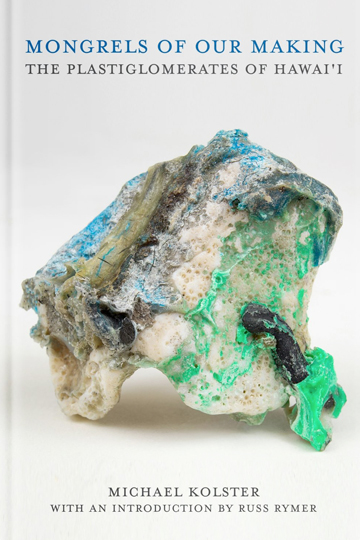
- Publisher: George F Thompson Publishing
- Available in: Hardcover
- ISBN: 9781960521095
- Published: October 30, 2025
Hawaiʻi’s “Big Island” is a place created by fire, being formed entirely from volcanic activity. Currently, it is home to four active volcanoes. Due to its position relative to the North Pacific trash gyre, the Big Island is also home to tons of plastic debris that ocean currents deposit on its shores, particularly on its remote Kamilo Beach. Much effort has been made to remove this debris, but the flow of trash onto the beaches continues unabated, and keeping these beaches clean is a never-ending task. Does clearing the beaches of plastic waste, only to bury it elsewhere, actually help? As plastic washes up on an island so recently formed from volcanic activity, we are reminded that everything here, including all forms and traces of life, has come from somewhere else.
Photographer Michael Kolster became interested in the issue of plastic debris on Kamilo Beach through a paper from the Geological Society of America whose authors claimed that the plastic debris, when melted or otherwise combined with rocks on the beach, would probably enter the fossil record to become a horizon marker for the Anthropocene. Dubbed “plastiglomerates” by geologists, these hybrid “stones” are the product of humans burning plastic, whether intentionally or accidentally, that then melts and become fused with the naturally occurring rocks that were created by volcanoes. These fusions of human and geological activity form a fossil-like record of present-day human activity that is likely to persist for thousands of millennia due to their prevalence, location, and composition.
Wanting to see these plastiglomerates for himself, Kolster traveled to Hawaiʻi, where he photographed Kamilo Beach and its plastiglomerates. He also collected examples of plastiglomerates that he took back to his studio in Maine. Kolster’s photographs of the plastiglomerates, from Hawai‘i and collected at home, show the harsh reality and surprising beauty of plastic trash from the beaches of a Pacific paradise. While this debris can be viewed as both an eyesore and an insult to our idea of what a tropical paradise like Hawai‘i should be, Kolster also shows how seeing plastic on the beach is equivalent to looking in the mirror: We need to look closer at our reflection before impulsively wiping it clean, only to have to do it over and over day after day, week after week, endlessly.
Reviews
“Without dismissing the environmental impact of plastic, Michael Kolster reveals through his evocative photographs a radical mode of perceiving synthetic substances, and by extension all supposedly artificial human objects, as organic parts of nature. His understated, granular images of ‘plastiglomerates’ (fused masses of plastic debris and lava rock found on a nearly inaccessible beach in Hawaiʻi), some photographed in situ and others individually against white backgrounds, possess an unearthly beauty that both evokes and transcends the vast scale of geological time. Kolster’s absorbing commentary adds another layer to a somehow profoundly unsettling book.”
-Jeffrey L. Meikle, author of American Plastic: A Cultural History
“Mike Kolster, in Mongrels of Our Making, depicts, among other things, beguiling anthropic rocks (known as plastiglomerates) that are appearing on a remote Hawaiʻian beach. Thought to be produced by beachside campfires, these meldings of marine-borne plastic garbage and chunks of coastal lava will likely mark our presence on the planet long after our uniquely inventive and destructive species has disappeared. Thoroughly exploring the intersection of art, geology, and plastic, the latter made from hydrocarbons, this fascinating and necessary book, with an incisive introduction by Russ Rymer, reflects the quandary of our age: How do we have it all and yet persist?”
-Laura McPhee, Professor Emerita at the Massachusetts College of Art and Design and author of River of No Return and Gateway: Visions for an Urban National Park
“The truth of ‘We have met the enemy, and he is us’ (Walt Kelly’s Pogo poster, Earth Day 1970) is embedded in Hawaiʻian plastiglomerates, denizens of our world’s humanature. Such mongrels exist not as mixed-breed dogs but as defiant, accidental amalgams of plastic and lava, to imbue this landscape with wonder and awe, as Mongrels of Our Making cleverly reveals.”
-Peter Goin, Foundation Professor, University of Nevada, Reno, and author of Humanature and Nuclear Landscapes
“Essayist Russ Rymer states that ‘[Kolster’s] studio portraits of these castaway mongrels strike [him] as equal parts beautiful and unsettling.’ Indeed, the whole book has this dichotomous quality. Equal parts information and image, exploration and presentation, data and emotional evocation, Kolster offers an extensive and immersive dive down a plastics-waste rabbit hole we probably didn’t want to know existed. But only the person who leads a plastic-free existence can afford ignorance of these ‘mongrels of our making.’ Kolster’s new book is an essential and eloquent exploration of finding ways to see and think about these inadvertent but compelling fusions of plastic and lava.”
-Rebecca A. Senf, Chief Curator of Photography, Center for Creative Photography, and author of Making a Photographer: The Early Work of Ansel Adams